Related Research Articles

Naim bey Frashëri, more commonly Naim Frashëri, was an Albanian historian, journalist, poet, rilindas and translator who was proclaimed as the national poet of Albania. He is regarded as a pioneer of modern Albanian literature and one of the most influential Albanian cultural icons of the 19th century.
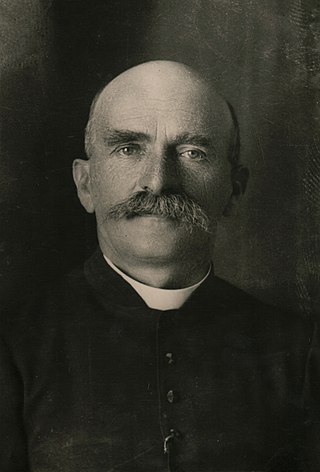
Ndre Mjeda was an Albanian philologist, poet, priest, rilindas, translator and writer of the Albanian Renaissance. He was a member of the Mjeda family.
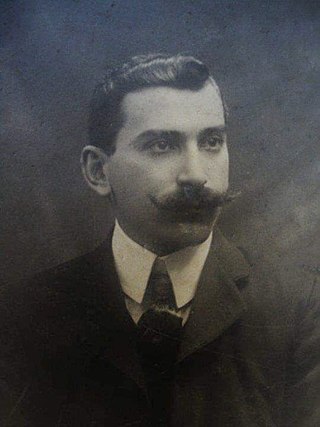
Luigj Gurakuqi, also called Louis Gurakuchi, was an Albanian writer and politician. He was an important figure of the Albanian National Awakening and was honored with the People's Hero of Albania medal.

Millosh Gjergj Nikolla, commonly known by the acronym pen name Migjeni, was an Albanian poet and writer, considered one of the most important of the 20th century. After his death, he was recognized as one of the main influential writers of interwar Albanian literature.
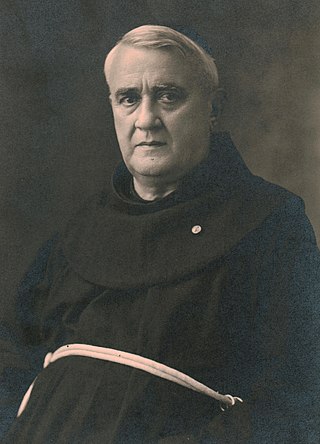
Gjergj Fishta was an Albanian Franciscan friar, poet, educator, rilindas, politician, translator and writer. He is regarded as one of the most influential Albanian writers of the 20th century, particularly for his epic masterpiece Lahuta e Malcís, and he was the editor of two of the most authoritative magazines after Albania's independence, Posta e Shypniës and Hylli i Dritës.

Leskovik is a town in Korçë County, in southeastern Albania. Historically, until 2015, it was a municipality, after which it became a subdivision of Kolonjë. The town is located close to the Greek-Albanian border. The population at the 2011 census was estimated as being 1,525.

The Pashalik of Scutari (1757–1831), also known as the Bushati Pashalik, was an Albanian pashalik ruled by the Bushati family. Its capital was Shkodër and ruled areas in modern-day Albania and large majority of modern-day Montenegro.

Zef Jubani or Giuseppe Jubany in Italian was an Albanian folklorist and activist of the Albanian National Awakening. He is known for the publication of a Collection of Albanian Folk Songs and Rhapsodies in the Gheg Albanian dialect. Jubani advocated the creation of a unique alphabet of the Albanian language. For his political activities, which often were anti-clericalist, Jubani was denounced to the Holy See by the Jesuit missionaries of Shkodër.
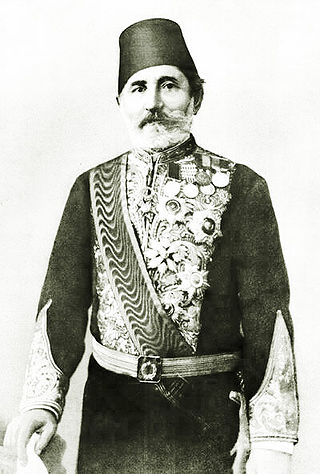
O Moj Shqypni is a poem written by Vaso Pasha, a political figure, poet, novelist, and patriot known for his role during the Rilindja. It was written between 1878, an important year for the League of Prizren and 1880. The poet, a critique of religious and political factionalism as a barrier to national unity of Albanians called for them overcoming religious divisions through a united Albanianism. In 1910, the music director of the orchestra of Vlorë melodized the poem.
Pjetër Zarishi or Dom Pjeter Xarishi was an Albanian Mirditë Catholic priest and poet who established a tradition of the 19th century Catholic literature in northern Albania. He is also noted for his literary contribution to the Albanian National Awakening. His poems were primarily religious and in less extent secular.

Zef Kolombi was an Albanian painter.

Ndoc Nikaj was an Albanian priest, writer, and historian. He was the first Albanian novelist to write and publish an original novel in the Albanian language, Shkodra e rrethueme of 1905.

Bernardin Palaj was an Albanian Franciscan friar, folklorist and poet.

Society for the Publication of Albanian Letters was a patriotic organization of Albanian intellectuals, promoting publications in Albanian, especially school texts, which were extremely important for the younger generation's education. It was founded on 12 October 1879 in Istanbul, Ottoman Empire.
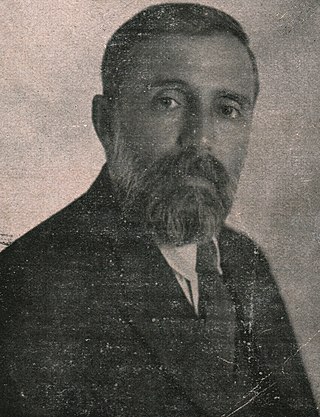
Kadri Prishtina (1878–1925), better known as Hoxha Kadri, was an Albanian political figure of the early 1920s.

Donat Kurti (1903–1983) was an Albanian Albanian franciscan friar, educator, scholar and folklorist. Donat Kurti was born in Shkodër, back then Ottoman Empire). He studied theology and philosophy at the Collegium Antonianum in Rome and was ordained as a Franciscan priest in 1927. After his return to Shkodra, he taught at the Illyrian college. Kurti was particularly interested in Albanian folklore and epic verse. With Bernardin Palaj, he published the best-known cycles of epic poetry in Kângë kreshnikësh dhe legenda , Tirana, 1937.

Preng Doçi (1846–1917), Italian: Primus Docci, was an Albanian political and religious figure and poet. He was a main contributor in the Albanian Bashkimi Alphabet.
Agimi was an Albanian literary society founded in Shkodër, Ottoman Empire in 1901.

Shkodër is the fifth-most-populous city of the Republic of Albania and the seat of Shkodër County and Shkodër Municipality. Shkodra has been continuously inhabited since the Early Bronze Age, and has roughly 2,200 years of recorded history. The city sprawls across the Plain of Mbishkodra between the southern part of Lake Shkodër and the foothills of the Albanian Alps on the banks of the Buna, Drin and Kir rivers. Due to its proximity to the Adriatic Sea, Shkodër is affected by a seasonal Mediterranean climate with continental influences.

The Jesuits in Albania refers to the Jesuits and Jesuit missions in Albania.
References
- ↑ Robert Elsie (2010), Historical Dictionary of Albania, Historical Dictionaries of Europe, vol. 75 (2 ed.), Scarecrow Press, p. 213, ISBN 978-0810861886
- ↑ Robert Elsie (2001), A Dictionary of Albanian Religion, Mythology, and Folk Culture, NYU Press, p. 132, ISBN 978-0814722145
- ↑ Owen Pearson (2006), Albania in the Twentieth Century, A History, vol. II: Albania in Occupation and War, 1939–45, I. B. Tauris, p. 493, ISBN 978-1845110147
- 1 2 Sabrina P. Ramet (1998), Nihil Obstat: Religion, Politics, and Social Change in East-Central Europe and Russia, Duke University Press Books, pp. 214, 224, ISBN 978-0822320708